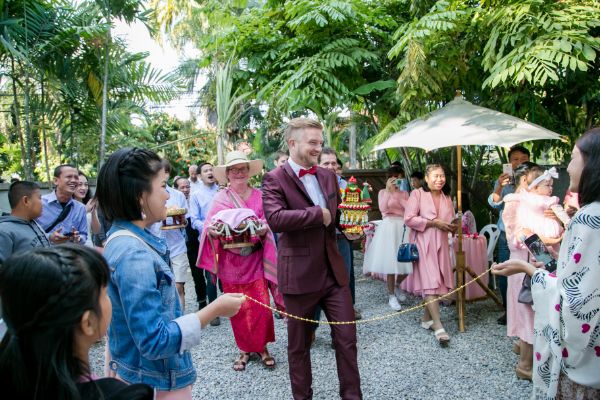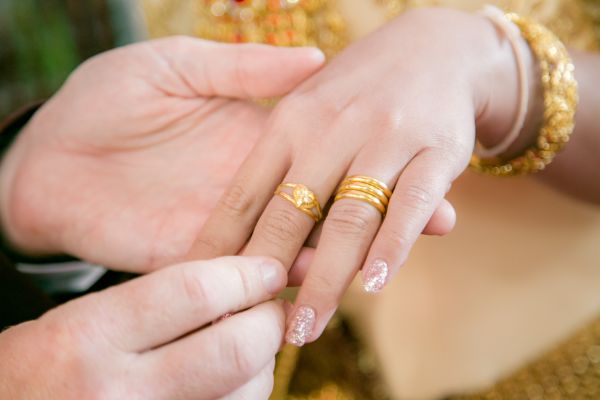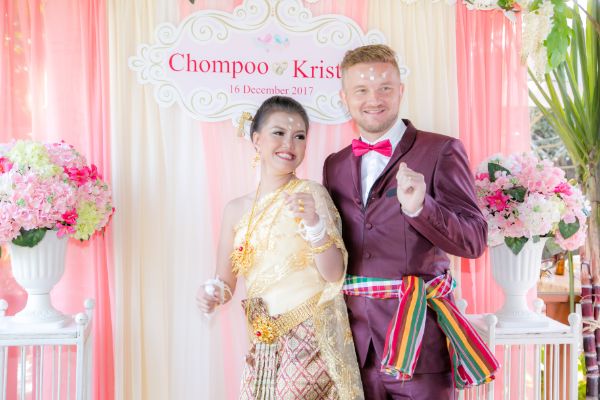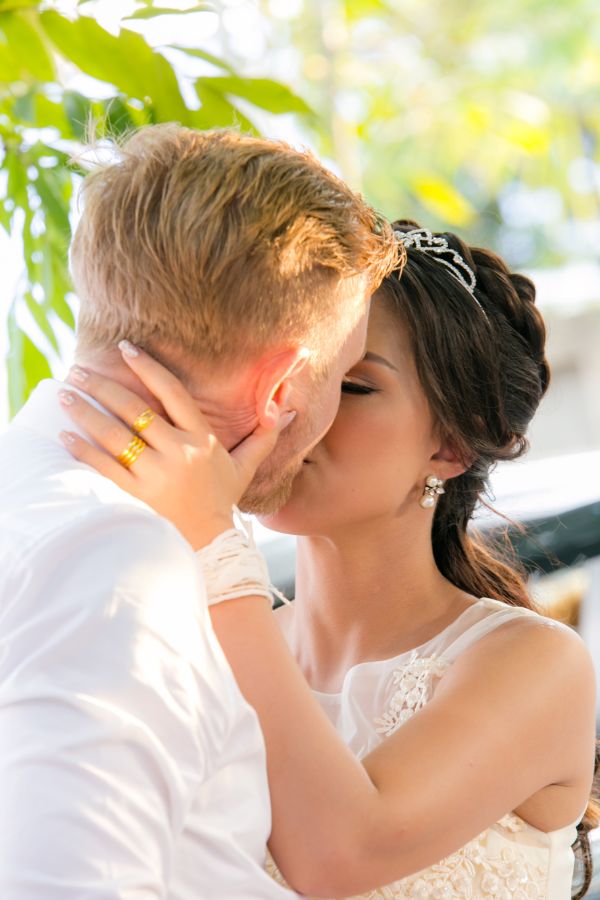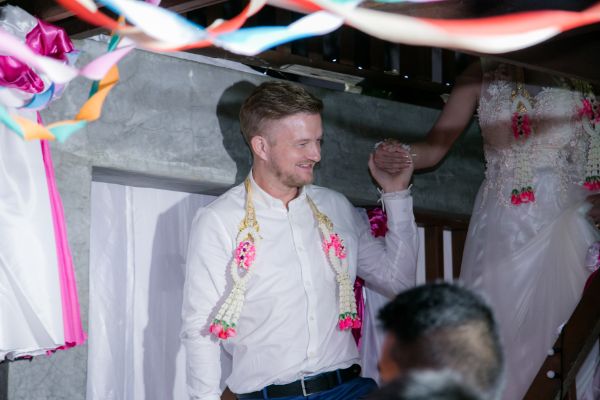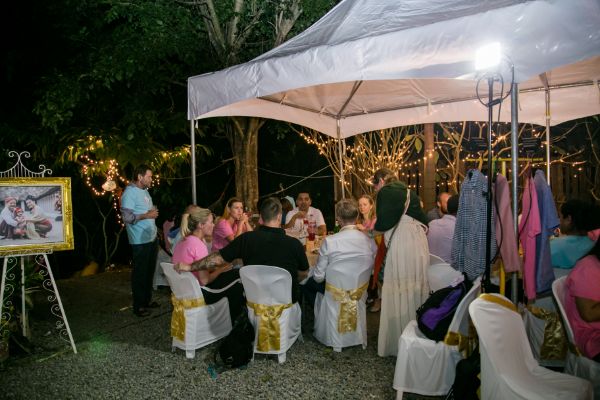Thailand, often called the “Land of Smiles,” is a mesmerizing blend of ancient traditions, vibrant culture, and breathtaking landscapes. From the tranquil azure waters of its southern beaches to the bustling heartbeats of cities like Bangkok, it offers many experiences.
For couples in love, the allure of Thailand goes beyond its scenic beauty. It promises a wedding backdrop that’s not just visually stunning but also deeply rooted in rich customs and rituals.
In December 2017, I tied the knot with my Thai wife. We opted to host the wedding at our home. The day was beautifully marked by Thai traditions in the morning, followed by an evening celebration with friends and family that lasted into the night. See pictures further down in the article
Kristian Ole Rørbye
Imagine standing hand in hand with your beloved, with the sun setting over the Andaman Sea, casting a golden hue over everything. The gentle sound of waves, the soft melodies of traditional Thai music in the background, and the scent of jasmine filling the air. This is the romantic setting that having your wedding in Thailand offers, making it a sought-after destination for weddings.
KEY TAKEAWAYS
- Thailand offers a rich blend of romantic venues, from serene beaches to historic temples.
- Traditional Thai wedding rituals, like the Water Ceremony, add depth and cultural significance to the celebration.
- Foreigners need to navigate specific legal requirements, including documentation and registration, to marry in Thailand.
- Incorporating Thai elements, from attire to cuisine, enhances the cultural richness of the wedding.
- Respecting Thai customs and understanding cultural sensitivities ensures a harmonious celebration.
- A Thai wedding is more than a ceremony; it’s an immersive cultural and romantic journey.
Understanding Thai Marriage Traditions
Thailand, with its rich cultural tapestry, offers a myriad of wedding traditions that have been passed down through generations. These rituals, deeply rooted in Buddhist and animist beliefs, are not just ceremonial but also symbolic, each carrying a profound meaning and purpose.
The Significance of the Thai Water Ceremony
One of the most poignant moments in a Thai wedding is the Rod Nam Sang, or the Water Pouring Ceremony. In this ritual, the couple sits side by side, their hands connected by a flower chain.
Elders and loved ones then approach the couple, pouring a gentle stream of water over their hands using a traditional Thai water vessel. As the water flows, blessings are whispered, wishing the couple a life filled with happiness, prosperity, and love.
This act is not just about seeking blessings but also symbolizes the purification and bonding of two souls.
The Beauty of the Khan Maak Procession
Before the water ceremony begins, there’s a vibrant and lively event known as the Khan Maak procession. This colorful parade symbolizes the groom’s journey to the bride’s home, showcasing his commitment and eagerness to marry her.
Accompanied by friends and family, the groom brings with him gifts wrapped in banana leaves and flowers, often presented in a ceremonial manner. Traditional music, dances, and sometimes even playful negotiations at the bride’s door add a touch of joy and festivity to this procession.
The Spiritual Essence of the Monk Blessing
For many Thai couples, especially those following Buddhist traditions, receiving blessings from monks is an integral part of the wedding. Early in the morning, monks are invited to the wedding venue, where they chant prayers and bless the couple.
The couple offers food and alms to the monks, seeking spiritual guidance and blessings for a harmonious life ahead. This serene and solemn ritual infuses the wedding with a deep sense of spirituality, reminding the couple of the sacredness of the vows they are about to take.
Legal Requirements for Foreigners Getting Married in Thailand
While the beauty and depth of Thai wedding traditions can be truly enchanting, foreigners need to be aware of the legal intricacies involved in getting married in Thailand.
Though straightforward, the process requires careful attention to detail to ensure that the union is recognized in Thailand and the couple’s home country.
Necessary Documentation
Before embarking on the romantic journey of a Thai wedding, couples must gather the necessary legal documents. Here’s what’s typically required:
| Document | Description |
| Valid Passports | Both parties must present their current passports. |
| Affidavits | Statements from embassies declaring both individuals are free to marry. |
| Previous Marriage Documents | If applicable, provide a divorce certificate or a death certificate of a deceased spouse. |
The Role of the Local District Office (Amphur)
Once the necessary documents are in hand, the next step is to visit the local district office, known as the Amphur. Here, the marriage will be officially registered. It’s worth noting that while traditional Thai wedding ceremonies are rich in cultural significance, it’s the registration at the Amphur that legally binds the marriage.
At the Amphur, the couple will fill out forms, submit their documents, and declare their intent to marry. Once the officials verify everything, the couple will sign the marriage certificate, making the union official.
The Importance of Translation and Legalization
Given that the legal proceedings in Thailand are conducted in Thai, it’s crucial for foreigners to have their documents translated. After translation, these documents should be verified and legalized, typically by the Thai Ministry of Foreign Affairs. This step ensures that the marriage is recognized internationally.
It’s also advisable for couples to check with their home country’s embassy or consulate in Thailand for any additional requirements or specific nuances related to their nationality.
Choosing the Perfect Venue
In the heart of Southeast Asia, Thailand boasts a diverse landscape that seamlessly blends the serenity of nature with the grandeur of history and modernity. This makes it a treasure trove of wedding venues, each offering its own unique charm and ambiance.
Whether you dream of a beachfront ceremony with the horizon as your backdrop or a regal affair in a historic setting, Thailand has something to cater to every romantic vision.
The Charm of Beach Weddings
Thailand’s coastline is dotted with pristine beaches, each more enchanting than the last. These locations are perfect for couples who dream of a barefoot ceremony on golden sands.
Phuket: Known for its stunning beaches and vibrant nightlife, Phuket offers a mix of tranquility and entertainment. Venues range from luxury resorts to secluded beach spots, catering to both grand celebrations and intimate gatherings.
Krabi: With its dramatic limestone cliffs and clear turquoise waters, Krabi is a paradise for nature lovers. Resorts here often offer wedding packages that include traditional Thai ceremonies against the backdrop of the Andaman Sea.
Koh Samui: This island is synonymous with luxury. Its upscale resorts, many of which are nestled on private beaches, provide an idyllic setting for a romantic wedding.
Historical Venues: Ancient Temples and Traditional Thai Houses
For those who wish to infuse their wedding with a touch of Thai history and culture:
Ayutthaya: The ancient capital of Thailand, Ayutthaya is home to ruins and temples that speak of a bygone era. Some venues allow couples to exchange vows amidst these historic remnants, offering a truly unique experience.
Traditional Thai Houses: There are beautifully preserved traditional Thai houses across Thailand, especially in places like Bangkok and Chiang Mai. These venues, often set amidst lush gardens, provide an intimate and culturally rich wedding setting.
Modern Luxury: Bangkok’s Grand Hotels and Resorts
The bustling metropolis of Bangkok, with its blend of tradition and modernity, houses some of the country’s most luxurious hotels and resorts.
Riverside Hotels: Overlooking the Chao Phraya River, these hotels offer a blend of urban sophistication and romantic vistas. Imagine exchanging vows as the city lights shimmer on the water’s surface.
Skyline Resorts: For those who dream of a wedding in the clouds, Bangkok’s skyline resorts, with their rooftop venues, promise an affair to remember. The panoramic views of the city add a touch of magic to the celebrations.
Incorporating Thai Elements into Your Wedding
A wedding in Thailand offers couples a unique opportunity to immerse themselves in a rich cultural tapestry. Couples can experience a deeper connection to the land and its traditions by incorporating traditional Thai elements into the ceremony and celebrations, making their union even more memorable.
Traditional Thai Wedding Attire: The Elegance of Silk and Gold
Thai wedding attire is a beautiful blend of elegance and symbolism.
For the Bride: Traditional dresses, often made of silk, come in vibrant colors like red, green, or gold. These dresses are intricately embroidered and often paired with a golden belt. A complementing Sabai, a silk sash, is draped over one shoulder, adding to the regal look. The ensemble is completed with delicate jewelry and hair accessories.
For the Groom: Men usually wear a silk shirt and trousers, often in shades complementing the bride’s attire. A traditional sash and a headpiece called a Mongkol can also be part of the ensemble.
Thai Wedding Music: The Rhythm of Love and Celebration
Music plays a pivotal role in Thai weddings, setting the mood and rhythm of the celebrations.
Traditional Instruments: Instruments like the Ranat (a type of xylophone), Khim (a dulcimer), and Saw (a stringed instrument) produce melodies that are both hauntingly beautiful and deeply rooted in Thai culture.
Wedding Procession Music: The Khan Maak procession, a significant part of the wedding, is often accompanied by lively beats, signaling the groom’s journey to claim his bride.
Delicacies to Include: From Sweet Sticky Rice to Spicy Curries
No Thai celebration is complete without a feast of local delicacies. Incorporating traditional Thai dishes into your wedding menu can be a delightful experience for the guests.
Appetizers: Spring rolls, satay skewers, and fresh salads with tangy dressings set the tone.
Main Course: Dishes like green curry, Pad Thai, and Tom Yum soup offer a burst of flavors, ranging from sweet and tangy to spicy.
Desserts: Mango with sticky rice, drenched in coconut milk, is a favorite. Other options include coconut puddings and traditional Thai cakes.
Navigating Cultural Sensitivities
Thailand, often referred to as the “Land of Smiles,” is renowned for its hospitality and warmth. However, like any culture, it comes with its own set of traditions and etiquette.
For foreigners getting married in Thailand, understanding and respecting these cultural nuances can enhance the wedding experience and foster deeper connections with the local community.
Respecting Thai Customs: Dos and Don’ts
While Thai people generally understand and forgive unintentional cultural missteps, being aware of certain customs can go a long way.
Wai Gesture: The traditional Thai greeting, the Wai, involves placing your hands together in a prayer-like position and bowing slightly. It’s a sign of respect, and while not mandatory for foreigners, returning a Wai can be a gracious gesture.
Temples and Religious Sites: If your wedding involves visiting or hosting ceremonies in temples, it’s essential to dress modestly. Women should cover their shoulders and knees, and men should avoid sleeveless shirts. Removing shoes before entering certain areas, especially religious ones, is also customary.
Public Displays of Affection: While Thailand is modernizing rapidly, it’s still conservative in some aspects. Avoid excessive public displays of affection, especially in religious or rural areas.
The Role of Family in Thai Weddings
Family is the cornerstone of Thai culture. In traditional Thai weddings:
Dowry or Sin Sod: Historically, the groom offers a dowry to the bride’s family, symbolizing his ability to support her. While this practice is evolving, it’s still prevalent in many Thai weddings. It’s essential to approach this custom with understanding and open communication.
Elders’ Blessings: As mentioned earlier, seeking blessings from elders, be it through the water ceremony or other rituals, is integral. It’s a sign of respect and plays a pivotal role in the wedding.
Gift-Giving Etiquette
If you’re inviting local Thai guests or if you’re a guest at a Thai wedding:
Monetary Gifts: It’s customary to offer money, usually in an envelope. The amount should be in accordance with one’s means, and it’s often given to help offset the wedding expenses.
Gift Wrapping: Gold and green are considered auspicious colors for weddings. If giving a physical gift, wrapping it in these colors can be a thoughtful touch.
Making Memories: Capturing the Moments
In the midst of the joy, laughter, and emotions that envelop a wedding, capturing those fleeting moments becomes paramount. After all, these are the memories that will be cherished for a lifetime. The opportunities for creating stunning visual memories are boundless in a land as picturesque and culturally rich as Thailand.
Hiring a Local Photographer
While you might consider flying in a photographer from home, there’s a unique advantage to hiring a local Thai photographer.
A local photographer knows the best spots, the perfect lighting, and the ideal times to capture the essence of Thailand, be it a sunset on a Phuket beach or the morning mist in Chiang Mai.
They’ll be attuned to the cultural nuances, ensuring that significant moments, rituals, and traditions are captured with the respect and reverence they deserve.
Unique Thai Backdrops: Floating Markets, Elephant Sanctuaries, and Golden Pagodas
Thailand offers a plethora of unique settings that can add a touch of magic to your wedding photos:
Floating Markets: Imagine a pre-wedding shoot amidst the vibrant chaos of a floating market, with colorful boats laden with fruits, flowers, and local delicacies.
Elephant Sanctuaries: For those looking for a touch of the exotic, an elephant sanctuary can be a majestic backdrop. These gentle giants, symbolic of strength and grace, can add a unique dimension to your photos.
Golden Pagodas and Temples: Thailand’s temples, with their intricate architecture and golden spires, provide a regal and historic setting for capturing moments of love.
The Magic of a Thai Sunset: A Photographer’s Dream
There’s something ethereal about Thai sunsets. As the sun dips below the horizon, casting a golden-pink hue over the landscapes, it creates a dreamy ambiance:
Beach Sunsets: The beaches of Thailand, with their palm-fringed coastlines and shimmering waters, offer a romantic canvas as day transitions to night.
Mountain Silhouettes: In the northern regions, the setting sun against the backdrop of mountains and valleys creates a dramatic and romantic setting.
Related: Car Rental in Thailand Guide: Tips for a Smooth Journey
Pictures from Chompoo & Kristian’s wedding in Chiang Mai (2017)
Below, you’ll find a curated selection of images that capture the essence and joy of our special day in Chiang Mai. Each photograph tells a story of love, tradition, and the vibrant spirit of Thai celebrations.
